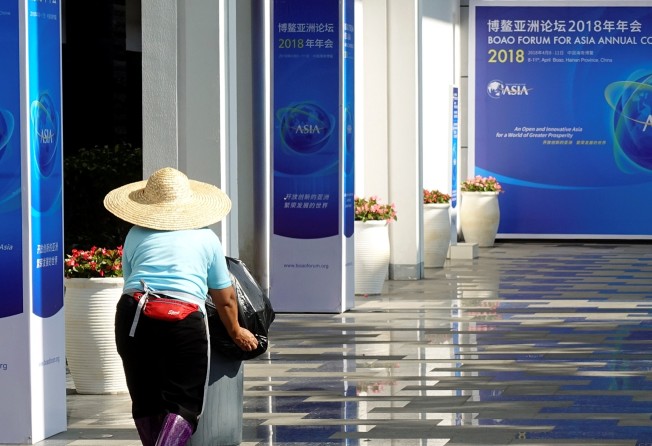AI-powered translation still needs work after errors mar debut at Boao Forum
AI-powered translation system from internet giant Tencent spouted gibberish during its first implementation at Asia’s Davos

The day that machines will surpass the ability of humans in language translation could still be many years away, following the breakdown of Tencent Holdings’ artificial intelligence-powered translation system during the Boao Forum for Asia in Hainan province last week.
Tencent’s simultaneous translation system, which was designed to provide both interpretation and transcripts, made an error-filled debut at the high-profile forum, sometimes known as Asia’s Davos.
It spouted gibberish that were displayed live on screen at the event and in a WeChat mini program. These included garbled characters, repeated words and even broken Chinese, screenshots of which were widely circulated on social media last week.
Tencent took the high ground by conceding the errors and aiming for improvements in future.
“The AI interpreter had some errors and gave wrong answers to several questions during the forum,” Tencent said in a statement. “Our simultaneous [translation] machine, an artificial intelligence (AI) product, has a drawback, but it is still learning and growing.”
That may have helped ease worries about machines taking more jobs away from people.
Machines are expected to surpass humans in language translation by 2024, in writing high-school essays by 2026, in driving a truck by 2027 and working in retail service jobs by 2031, according to research published last year by Oxford University’s Future of Humanity Institute and Yale University.
The Oxford-Yale AI impact research, based on a survey of 352 machine-learning experts, estimated a 50 per cent chance that AI will outperform humans in all tasks in just 45 years, and could take over every job in the next century.
Tencent co-founder Chen Yidan, however, said in March that dramatic technological change like AI “could possibly replace some jobs, but at the same time, it also creates jobs”.
The errors made by Tencent’s AI translation system at the Boao Forum appeared to show that human interpreters cannot be easily replaced by machines.
“I do not think the technology is mature enough … Maybe in the next two years,” said Lim Huisin, who has served as a conference interpreter on the mainland for the past five years. “I am not too worried about being replaced by machine.”
Tencent’s AI system at the Boao Forum, for example, translated “Belt and Road Initiative” – China’s international infrastructure development plan that covers more than 68 countries – as “a road and a waistband”.
Hong Kong-listed Tencent had blamed the speaker at the event for that mistake. It said the software was confused when the initiative was erroneously called “Road and Belt”.
“Many speakers do not talk in a logical and clear way, and they jump back and forth or repeat a lot,” Lim said. “So during interpretation, we have to consider context and background information.”
Other industry researchers see more work ahead for proponents of machine translation. “Machines could do a good job in translation and interpretation in the future, but these cannot do as well as humans right now,” said Lily Wang, a researcher working on her PhD in machine learning at Boston University in the United States. “The difficulty is that people talk with emotions and context, but technology can’t read people’s feelings. Most programmers who develop these AI interpreters usually do not have a good understanding of linguistics.”
Worries, however, are growing over the steady job displacements targeted by automation.
A recent study by Boston Consulting Group found that 23 per cent of the total 9.9 million jobs in China’s banking, insurance and securities sectors will be affected, with entry-level staff engaged in repetitious daily operations bearing the brunt of job cuts.
In January, AI software developed by Alibaba Group Holding, the parent of South China Morning Post, performed better than humans in a global reading comprehension test for the first time.
China’s cabinet, the State Council, laid out goals in July last year to build a domestic AI industry worth US$150 billion by 2030, when the country will become an innovation centre for the technology.